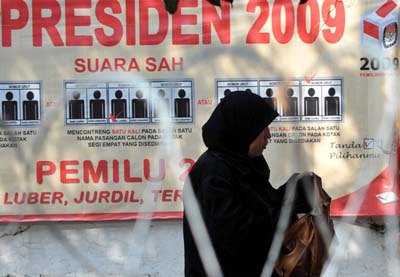The quality of Indonesia’s democracy, however, continues to face problems. This is exemplified by the large electoral management mess experienced this year. The Indonesian Bulletin of Economic Studies identifies the continuing weakness of the KPU (the election commission). The process of recruiting KPU members to run the elections has endemic problems, because of inexperience and ill-preparedness to do the job. These people with little experience were expected to undertake the herculean task of running an election for 174 million electors, in which there were 112,000 candidates, 400-500,000 polling stations and 700 million ballots to be cast across the archipelago.
One of the key defects in the election process in 2009 was the issue of the DPT (the exact vote data). The electoral list really excluded a lot of Indonesians, many of whom were able to vote but were not registered and therefore not recognised.
The problems with managing the elections inevitably led to large numbers of constitutional challenges in the courts. Although the outcomes of these contests were largely accepted, some of the major parties threatened to boycott the presidential elections because of their lack of legitimacy. Despite these problems, Indonesian democracy held together.
The outcome of the Presidential elections was no surprise at all. A lot of people have said that SBY did not win the election, the other two leaders lost. Questions of image and personality figured prominently in SBY’s victory, especially his bijaksana or calmness. More important than personality was the popularity of his politics.
What about the role of Islamic forces in the election? Votes for Islamic parties continued to decline in 2009. Many argue that Islam is no longer a significant force in Indonesian politics. None of the presidential candidates came from so-called Islamic groups. Attacks aimed at discrediting SBY’s credentials as a Muslim did not stick. Two of the largest Muslim organisations gave their support to Jusuf Kalla from the Golkar party. Ordinarily, this might have resulted in at least 65 million votes for Kalla, however the outcome was very different.
All this points to a decline in the significance in the role of Islam in Indonesian politics. This is not to say that Indonesian politics will become secular. Islamic parties have always tried to present an open image and to avoid the use of Islamic jargon. They do not run on the basis that they will turn Indonesia into an Islamic state. On the other hand, the so called secular nationalist parties have become more Islamic in a sense that they have become more sensitive to Muslim interests. The division between secular nationalist and Islamic parties has narrowed Indonesia’s politics.
There will be more continuity than change following SBY’s construction of a grand coalition or ‘rainbow cabinet’. This may create more of the problems that we have witnessed over the last five years of slow and cumbersome decision-making. But there are also signs that he may be more assertive over the next five years.

